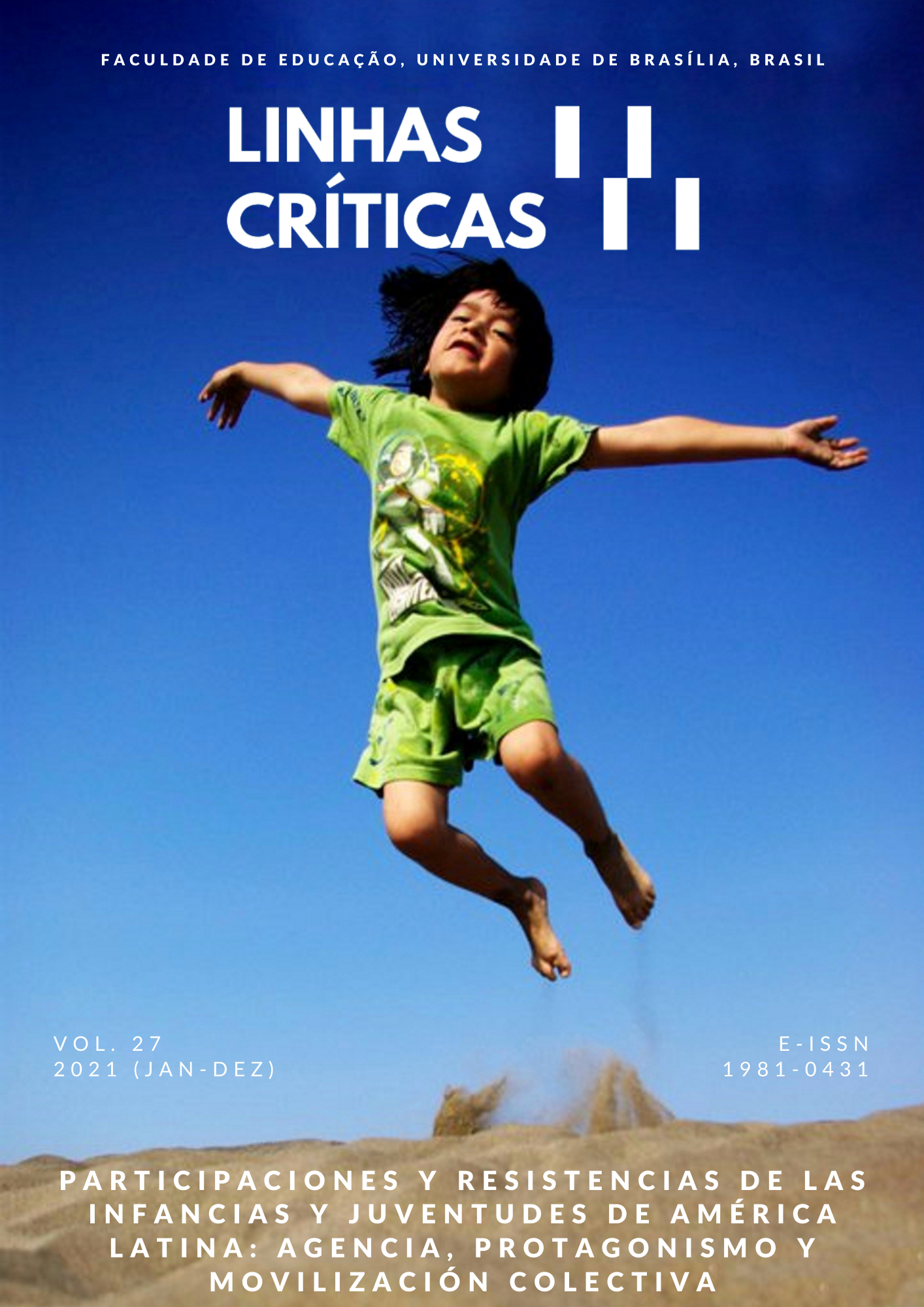Being a Zapatista at 4 years old. Socialization and subjectivity of Tseltal children
DOI:
https://doi.org/10.26512/lc27202136961Keywords:
Early childhood indigenous, Dialogic research, Sociology of ChildhoodAbstract
Through a pedagogical and autonomous political process, the Zapatistas not only counteract the counterinsurgency war Mexican Government, since 1994, but also promote the sociocultural reproduction and change of the new generations, configuring the socio-educational practices of children. This article reviews the processes of socialization and subjectivation of children under 6 years of age, as well as the intersubjective relationships that they establish with their elders. The youngest children teach us with their words, games and attitudes what it means to be a Zapatista, to live in resistance in the face of war, contradicting the hegemonic paradigm about early childhood.
Downloads
References
De León, L. (2005). La llegada del alma. Lenguaje, infancia y socialización entre los mayas de Zinacantán. CIESAS-CONACULTA.
Dreher, J. (2010). Fenomenología: Alfred Schütz y Thomas Luckmann. UAM - Iztapalapa - Universidad de Konstanz.
Echeverría, M., & Luna, M. T. (2016). La subjetividad infantil en contextos de conflicto armado Argumentos. Estudios Críticos de la Sociedad, 81, 39-60. https://argumentos.xoc.uam.mx/index.php/argumentos/article/view/77
Instituto Nacional de Salud Pública (INSP), & Fondo de las Naciones Unidas para la Infancia - México (UNICEF-M). (2016). Encuesta Nacional de Niños, Niñas y Mujeres. Indicadores Múltiples por Conglomerados. Informe Final. https://www.insp.mx/enim2015.html
Lenkersdorf, C. (2002). Filosofar en clave tojolabal. Porrúa.
Martín-Baró, I. (1990). De la guerra sucia a la guerra psicológica: el caso de El Salvador. En I. Martín Baró. Psicología Social de la Guerra: trauma y terapia (pp. 159-153). UCA Editores.
Ospina-Alvarado, M. C. (2013). La subjetividad de niños y niñas en el conflicto armado colombiano: una construcción social. En S. Alvarado, & J. Patiño (Coords.). Jóvenes investigadores en infancia y juventud, desde una perspectiva crítica latinoamericana: aprendizajes y resultados (pp. 37-60). Centro Editorial CINDE - Childwatch.
Paoli, A. (2003). Educación, Autonomía y Lekil Kuxlejal. Aproximación sociolingüística a la sabiduría de los tseltales. UAM-X-Comité de Derechos Humanos Fray Pedro Lorenzo de la Nada.
Pérez, S., Santiago, C., & Álvarez R. (2002). Ahora apuestan al cansancio. Chiapas: fundamentos psicológicos de una guerra contemporánea. Centro de Derechos Humanos Miguel Agustín Pro Juárez-Grupo de Acción Comunitaria.
Reguillo, R. (2000). La clandestinidad centralidad de la vida cotidiana. En A. Lindón (Coord.). La Vida cotidiana y su espacio-temporalidad (pp. 55-79). Editorial Anthropos.
Rico, A. (2018). Infancias y maternidades zapatistas: subjetividades políticas emergentes en las prácticas educativas y de resistencia-rebelde frente a la contrainsurgencia en Chiapas. [Tesis Doctoral, Universidad Veracruzana]. Repositorio institucional de la Universidad Veracruzana https://www.uv.mx/pdie/files/2018/03/Tesis_Norma-Angelica-Rico-Montoya.pdf
Rico, A., Corona, Y., & Nuñez K. (2018). La participación política de la niñez zapatista en Chiapas. Enseñanza y aprendizaje de la organización y la resistencia indígena. Sociedad e Infancia, 2, 79-101. http://doi.org/10.5209/SOCI.59455
Salles, V. (1992). Las familias, las culturas, las identidades. Colegio de la Frontera Norte.
Tebet, G. G. de C., & Abramowicz, A. (2014). O bebê interroga a sociologia da infância. Linhas Críticas, 20(41), 43-61. https://doi.org/10.26512/lc.v20i41.4254
Vila, I. (1998). Familia, escuela y comunidad. ICE-Horsori.
Vygotsky, L. (1988). Pensamiento y Lenguaje. Ediciones Quinto Sol.

Published
How to Cite
Issue
Section
License
Copyright (c) 2021 Angélica Rico Montoya

This work is licensed under a Creative Commons Attribution 4.0 International License.
Authors who publish in this journal agree to the following terms:
-Authors maintains the copyright and grants the journal the right of first publication, the work being simultaneously licensed under the Creative Commons Attribution License which allows the sharing of the work with recognition of the authorship of the work and initial publication in this journal.
- Authors are authorized to enter into additional contracts separately, for non-exclusive distribution of the version of the work published in this journal (eg publish in institutional repository or as a book chapter), with acknowledgment of authorship and initial publication in this journal.
-Authorers are allowed and encouraged to publish and distribute their work online (eg in institutional repositories or on their personal page) at any point before or during the editorial process, as this can generate productive changes as well as increase the impact and the citation of published work (See The Effect of Free Access).


